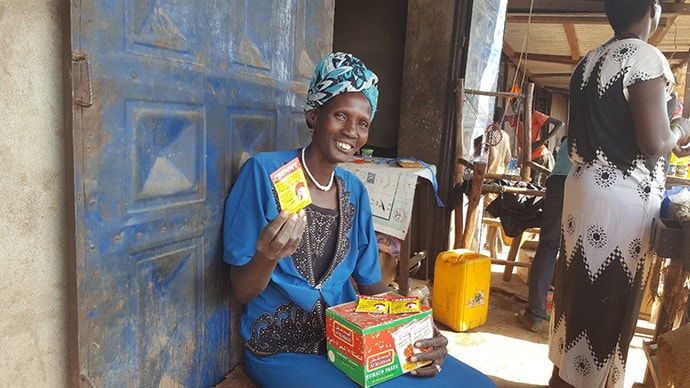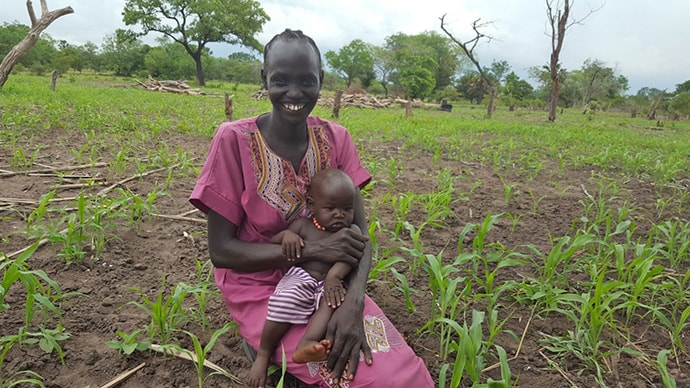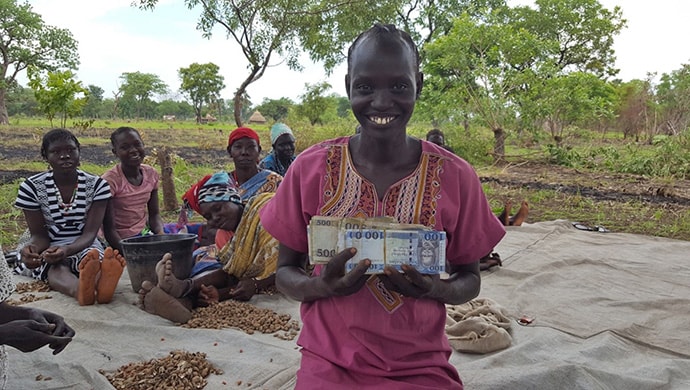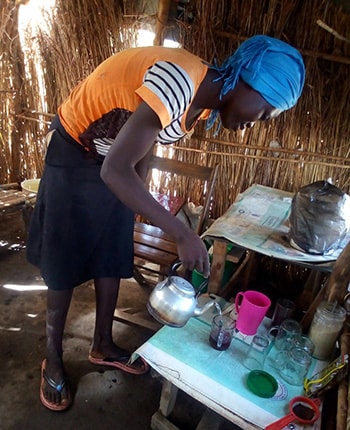By Cathy Herholdt, Senior Communications Director, World Concern

Photo credit World Concern. Abuk Lino at her shop.
When COVID-19 forced businesses to close and people to stay home in Kuajok, South Sudan, families had to spend their savings to survive. When things reopened, many were unable to restart their businesses.
But for widow and mother of four, Abuk Lino, her savings group enabled her to not only feed her family during the pandemic shutdowns, but to keep her small shop going after the village market reopened.
“I am lucky that I joined this savings group,” said Abuk. “My only hope for living during these hard times is our saving group. I got loans from my group, even when meetings were temporarily suspended. I used these loans to do small business to feed my family. I am lucky that my group has advanced money for me to continue with the business.”
With disruptions to markets and no access to banking services, savings groups continued to be a critical economic pillar in South Sudan during the pandemic. Groups offered members access to credit and the ability to stay afloat and bounce back during what has proven to be an economic crisis as well as a health crisis.
Skyrocketing inflation and the decrease in value of the South Sudanese Pound in local markets challenged the sustainability of savings groups in 2020. But groups that put their training to use and innovated, survived.
Take the Cinhuk Cien savings group, for example. After the 36-member group received training on livelihood diversification and investments, they decided to purchase a 30-acre piece of land and groundnut seeds. Groundnuts are a staple food and fast-moving commodity in the region. The group estimated their crop would yield about 200 bags of groundnuts at harvest, which would earn them 2.5 million SSP (about $8,000 USD).
The group’s vice chair, Mama Ayak, explained their strategy. “The South Sudanese pound is currently losing value, so keeping the money idle in the box is not earning members any profit. But investing this money will give them good return next season. Many members of the community have been affected because of Coronavirus and they have no money for farming during this season. We wanted to invest our savings in farming because next year there will be hunger in this community and many people will be looking for food to buy, so they will buy our groundnuts and we will get good profit from our investment,” she said.
“Here in South Sudan, World Concern goes to the very end of the road, where access to financial services and words like ‘banking,’ ‘microfinance’ or ‘credit’ do not exist,” explained World Concern South Sudan Country Director, Joshua Bundi. “While we put a lot of effort in training these communities on production of food crops and assist them with inputs, the life of dependency may not be changed much by these activities only. It is with this in mind that we have Savings and Loans for Transformation (SALT) groups as a cross cutting activity in our programming.”
Bundi goes on to say, “It is in these SALT groups that we train them to save however little, and to budget even when they do not have money to budget for, and prioritize savings as the insurance for tomorrow’s needs. It is this understanding and prioritizing the saving groups that has helped women who once had nothing to save, to own property, regain dignity, contribute to the family needs, … educate their children and pay their medical bills.”
One of those women is Abuk Diing, a 38-year-old mother of three. She’s part of a savings group that meets every Saturday and saves 500 SSP each week. She was given her first loan of 2,000 SSP, which she planned to invest in her small alcohol brewing business. At the encouragement of World Concern’s community facilitator, she agreed to diversify her income sources and with her second loan of 8,000 SSP ($51 USD) she ventured into farming, cleared her land, and planted sorghum, maize, and groundnuts. After successfully paying back her first two loans, she received a third loan, which she used to hire labor and purchase more seeds for her farm.

Photo credit World Concern. Abuk Diing on her farm.
“I am very happy for the savings program in our village; all will be well for me and my children next year. No hunger again in my family now that I have cultivated my farm.” said Abuk.
The group’s secretary said the program has changed the lives of many group members, enabling them to purchase farming equipment, expand their farms, and increase their income.
And although Abuk never had the chance to receive an education herself, she is excited that many group members are now sending their children to the local primary school. She’s also planning to save to build a house next year.

Photo credit World Concern. Abuk Diing.
Seventeen-year-old Martha Akur Nyibang learned through her village’s savings group that her charcoal business was harmful to the environment. With support, training, and loans, she was able to save 7,000 SSP in three months and started her own tea shop in the market in her village. Her business earns her 3,000 SSP each week. With her profit, she has bought chickens and sorghum for additional food and income.

Photo credit World Concern. Martha Akur Nyibang in her teashop.
“Saving groups have made once dormant villages become alive and vibrant in business and regain dignity as they have their own livelihood from their savings,” said Bundi.
Showing a savings box full of money, one group chair said her group is self-sustaining, so she hopes to see this process take root in surrounding communities.
“Our lives are transformed, we have enough food, our children are healthy and in school,” she said. “We are now ok, so we request you support the next village so that they will be like us.”
There are currently more than 2,000 World Concern village savings groups operating in the countries World Concern serves. To learn more about World Concern’s economic development programs, please visit https://worldconcern.org/what-we-do/economic-empowerment/.